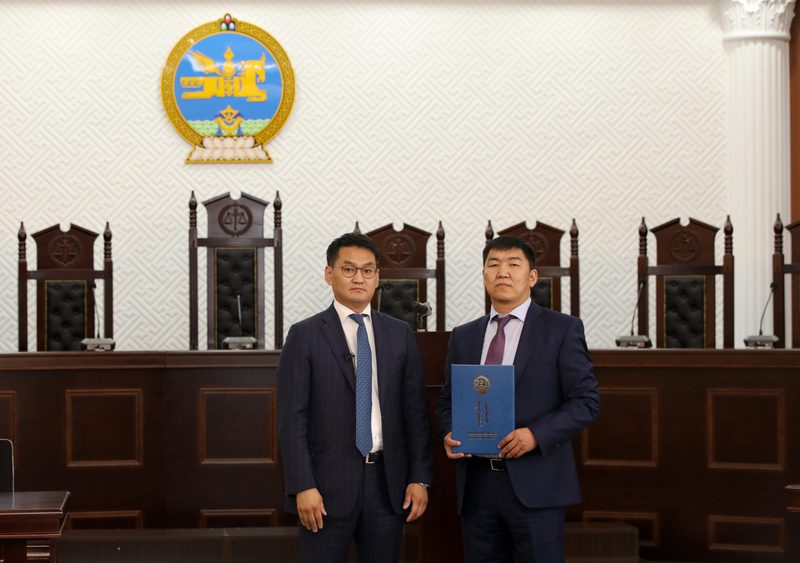BRIEF INTRODUCTION OF PACKAGE LAW ON COURTS
The Package of Laws on Courts initiated by the President of Mongolia and passed by the Parliament came into force from April 15, 2013. These newly adopted laws include Law on Courts, Law on Judicial Administration, Law on Legal Status on Lawyers, Law on Legal Status Citizens Representatives to the Court and Law on Mediation and Conciliation.
LAW ON COURTS
The purpose of this law is to regulate relations concerning the legal basis for judicial system, organization, powers and operation, and establishing the guarantees for exercising the judicial power. This law, includes judicial independence, creation of proper workload and ensuring the principles of transparency, and adjustments to reduce the internal sovereignty of the Court. In order to ensure Independence of the judiciary this law focuses on complex of organizational guarantees; economic, political, legal towards and security trends. According the new, law the courts except the Supreme Court will be established by a constituency basis such as size of territories, location, and population density and depending on the number of cases or disputes decided. Primary and appellate courts are established on specialized types of cases such as criminal, civil and administrative matters.
LAW ON LEGAL STATUS OF JUDGES
The purpose of this law is to regulate the relations concerning the legal status of judges, including the qualification and requirements for judges with a function to exercise the judicial power, the powers of judges the impartiality judges and its guarantees.
General qualification and requirements for judges is determined at each levels of court stage. Candidates who meet the requirements set in the law, with relevant experience on judiciary such as lawyers, prosecutors, judges and law school professors can nominate for a judge position.
Ensuring social and economic guarantees of Judges, following provisions set in the law such as judges salary will be increased by two percent every year from the fifth year of his or her service; under no circumstances the parliament shall not reduce the amount of salary, benefits and bonuses paid to judges; and life and accident insurance premiums are responsible for the state budget.
LAW ON LEGAL STATUS OF LAWYERS
Purpose of this law is to set forth the legal grounds for legal status of lawyers, licenses for participating on professional activities, professional reputation and accountability system, and directions and organization of professional self-governing institution for lawyers.
According to this law, it is established the Lawyers association /BAR association/, self-governing professional institution, and every lawyer who passed the professional exam, regardless of his or her position shall be a member of this association. Lawyers Association has a power to organize lawyer’s examination, issue the license for professional activities, continuous training on professional activities and approve rules on lawyers activities, jointly accredits law school with the central government organization, make a conclusions on candidates who nominated for judge position and impose a liability to advocate, judges, prosecutors who conducted malpractice. Concepts of this law is transferring some government functions to Professional self-governing institution will decentralize the government and improve the professional quality.
LAW ON JUDICIAL ADMINISTRATION
Purpose of this law is regulating the relations concerning the functions, organization, operational principles of the judicial administration, and to determine the legal status of judicial administrative personnel. The General Judicial Council shall be composed of five members whose serve on full time basis and their term of office shall be for three years. The General Judicial Council shall have administrative office. The General Judicial Council’s basic form of operation is the Council sessions and council session will be held at least twice a month. Members of the General Judicial.
Council will be nominated from the all levels of court. According to Law on Judicial administration, Judicial Qualification Committee shall consists of nine part-time members including lawyers and academics and prohibited certain activities of committee.
LAW ON LEGAL STATUS OF CITIZEN’S REPRESENTATIVES TO COURT
Citizen’s representatives are required to be legally capable citizens of Mongolian who attained age of 25; to be a permanent resident in the territory under jurisdiction of respective court of first instance; have no criminal record; not be a participant in either criminal, civil or administrative case proceedings at the time of selection. Any other conditions shall not be required to Citizen’s representatives. If citizen’s representatives have interest’s conflict with the case parties, so they are not allowed to take a part on a trail. Also, a Member of Parliament, judges, prosecutors, advocates and certain officials are prohibited to elect as a citizen’s representatives to Court.
Certain activities are prohibited for citizen’s representatives such as abandon and leaving the court hearing or not attending it without any respectful reasons; not enforcing the rules of court hearing; visibly supporting the case parties and meeting with an either parties of the case; collecting the evidence concerning the case; disclosing any confidential information of the state, organization or an individual; and providing any information to the a mass media with in regard to be those attended by the citizen’s representatives.
LAW ON MEDIATION AND CONCILIATION.
The purpose of this law shall be to determine a legal basis for settling the legal disputes through non-judicial methods with a support from the mediators and to regulate the relations concerning the implementation of mediation and conciliation. Therefor mediation and conciliation shall be applied to the cases related to the commercial and other economic activities, civil law disputes, individual labor disputes and family relations.
Court based mediation and conciliation is one component of judiciary. General Judicial Council shall be responsible for organizing this activity, and related costs shall be included in the court budget. The General Judicial Council shall established the Council of Mediators on part-time basis with functions of organizing a task for selection of mediators, certification, preparation and retraining.
 Монгол
Монгол English
English
